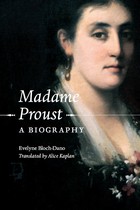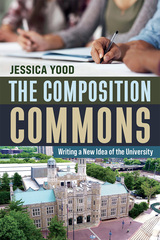2 books about Mothers of authors

Madame Proust
A Biography
Evelyne E. Bloch-Dano
University of Chicago Press, 2007
Marcel Proust’s In Search of Lost Time opens with one of the most famous scenes in literature, as young Marcel, unable to fall asleep, waits anxiously for his mother to come to his bedroom and kiss him good night. Proust's own mother is central to the meaning of his masterpiece, and she has always held a special role in literary history, both as a character and as a decisive influence on the great writer’s career. Without knowing much about her, we think of her as the quintessential writer's mother.
Now Evelyne Bloch-Dano’s touching biography acquaints Proust fans with the real Jeanne Weil Proust. Written with the imaginative force of a novel, but firmly grounded in Jeanne and Marcel Proust’s writings, Madame Proust skillfully captures the life and times of Proust’s mother, from her German-Jewish background and her marriage to a Catholic grocer’s son to her lifelong worries about her son’s sexuality, health problems, and talent. As well as offering intimate glimpses of the Prousts’ daily life, Madame Proust also uses the family as a way to explore the larger culture of fin-de-siècle France, including high society, spa culture, Jewish assimilation, and the Dreyfus affair. Throughout, Bloch-Dano offers sensitive readings of Proust’s work, drawing out the countless interconnections between his mother, his life, and his magnum opus.
Those coming to In Search of Lost Time for the first time will find in Madame Proust a delightful primer on Marcel Proust’s life and times. For those already steeped in the pleasures of Proust, this gem of a biography will give them a fresh understanding of the rich, fascinating background of the writer and his art.
Now Evelyne Bloch-Dano’s touching biography acquaints Proust fans with the real Jeanne Weil Proust. Written with the imaginative force of a novel, but firmly grounded in Jeanne and Marcel Proust’s writings, Madame Proust skillfully captures the life and times of Proust’s mother, from her German-Jewish background and her marriage to a Catholic grocer’s son to her lifelong worries about her son’s sexuality, health problems, and talent. As well as offering intimate glimpses of the Prousts’ daily life, Madame Proust also uses the family as a way to explore the larger culture of fin-de-siècle France, including high society, spa culture, Jewish assimilation, and the Dreyfus affair. Throughout, Bloch-Dano offers sensitive readings of Proust’s work, drawing out the countless interconnections between his mother, his life, and his magnum opus.
Those coming to In Search of Lost Time for the first time will find in Madame Proust a delightful primer on Marcel Proust’s life and times. For those already steeped in the pleasures of Proust, this gem of a biography will give them a fresh understanding of the rich, fascinating background of the writer and his art.
[more]

She Came from Mariupol
Natascha Wodin
Michigan State University Press, 2022
WINNER OF THE 2017 LEIPZIG BOOK FAIR PRIZE—When Natascha Wodin’s mother died, Natascha was only ten years old—too young to find out what her mother had experienced during World War II. All the little girl knew was that they were detritus, human debris left over from the war. Years later, Natascha set out on a quest to find out what happened to her mother during that time. Why had they lived in a camp for “displaced persons”? Where did her mother come from? What had she experienced? The one thing she knew is that her parents had to leave Mariupol in Ukraine for Germany as part of the Nazi forced labor program in 1943. Armed with this limited knowledge, Natascha resolved to piece together the puzzle of her family’s past. The result is a highly praised, beautiful piece of prose that has drawn comparisons to W. G. Sebald in its approach. Like Sebald, Natascha’s aim is to reclaim the stories of those who can no longer speak for themselves. The author is not only in search of her own family’s history, but she is also aware that she is charting unmarked territory: accounts of the plight of forced laborers and displaced persons are still a rarity within literature about World War II and its atrocities. Natascha’s personal homage to her mother’s life story is an important lyrical memorial for the thousands of Eastern Europeans who were forced to leave their homes and work in Germany during the war, and a moving reflection of the plight of displaced peoples throughout the ages. This is a darkly radiant account of one person’s fate, developing momentous emotive power—its subject serves as a proxy for the fate of millions.
[more]
READERS
Browse our collection.
PUBLISHERS
See BiblioVault's publisher services.
STUDENT SERVICES
Files for college accessibility offices.
UChicago Accessibility Resources
home | accessibility | search | about | contact us
BiblioVault ® 2001 - 2024
The University of Chicago Press









